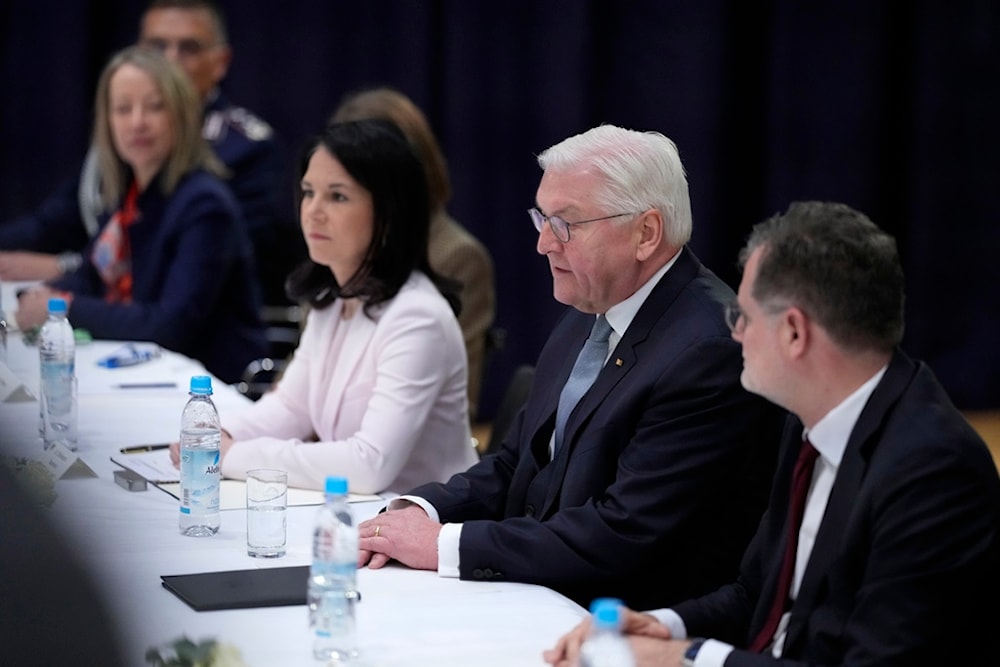German President slams US for undermining 'established rules'
The German president warned against a world order driven by unilateralism and unpredictability, cautioning that "the absence of rules should not become the guiding principle of a new world order."
-

Germany's President Frank-Walter Steinmeier, center right, and Germany's Foreign Minister Annalena Baerbock, center left, during a meeting with United States Vice-President JD Vance, on the sidelines of the Munich Security Conference in Munich, Germany, Friday, Feb. 14, 2025 (AP Photo/Matthias Schrader)
At the Munich Security Conference, German President Frank-Walter Steinmeier strongly criticized the US foreign policy approach under President Donald Trump, arguing that it undermines established international norms and partnerships. His remarks come as European leaders grapple with growing uncertainty over Washington's commitments to NATO and transatlantic security.
"It is evident that the new American administration adheres to a worldview that is very different from ours, one that shows no respect for established rules, for partnerships that have developed over a long period, and for the trust that has been built over time. We cannot change this. We must accept it, and we will deal with it," Steinmeier stated.
The German president warned against a world order driven by unilateralism and unpredictability, cautioning that "the absence of rules should not become the guiding principle of a new world order." His remarks reflect growing fears in Europe that Trump's leadership could further strain US-EU relations, weaken NATO, and upend global stability.
Vance Signals US Foreign Policy Shift Under Trump
Steinmeier's speech followed comments from US Vice President JD Vance, who affirmed a shift in Washington's foreign policy, stressing a more transactional approach to global security.
"There is a new sheriff in town and under Donald Trump's leadership we may disagree with your views but we will fight to defend your right to offer it in the public square. Agree or disagree," Vance said, reinforcing the administration's focus on free speech and sovereignty over multilateral commitments.
Vance also called for Europe to take greater responsibility for its own defense, reflecting Trump's long-standing demand that NATO members increase their military spending. "We think it's an important part of being in a shared alliance together that the Europeans step up while America focuses on areas of the world that are in great danger," he told the audience.
His comments have intensified European concerns that Trump's presidency could lead to a reduction—or even withdrawal—of US security commitments to Europe, particularly amid the ongoing war in Ukraine. A senior EU official, speaking to Politico, said European leaders are already preparing for the possibility that Washington may scale back its military support for the continent.
Free Speech vs. European Regulation: A Growing Divide
A key issue highlighted at the conference was the growing divide between US and European views on free speech regulation.
Vance argued that the biggest threat facing Europe is not Russia or China, but internal restrictions on free speech. "The threat that I worry the most about vis-a-vis Europe is not Russia. It's not China, it's not any other external actor. And what I worry about is the threat from within. The retreat of Europe from some of its most fundamental values," he said.
He criticized European laws, particularly the EU's Digital Services Act (DSA), which aims to regulate online content and combat misinformation. While European leaders defend the DSA as necessary to counter disinformation and extremist propaganda, critics argue that it could be used to silence dissenting views.
Read more: Europe confronts Musk, Zuckerberg, and Trump's provocations: Le Monde
The Munich Security Conference, running from February 14-16, has become a focal point for the growing tensions between Washington and European allies. While some leaders, such as French President Emmanuel Macron, have urged Europe to take greater responsibility for its own defense and economic independence, others fear that Trump's return will destabilize transatlantic cooperation.

 4 Min Read
4 Min Read










